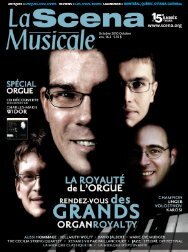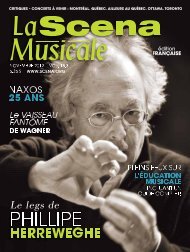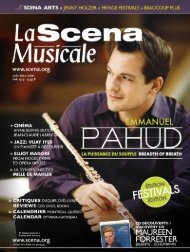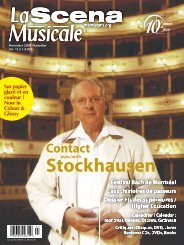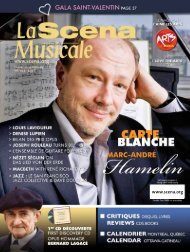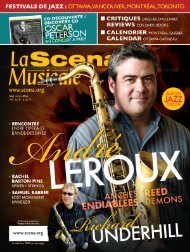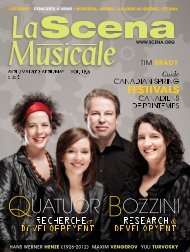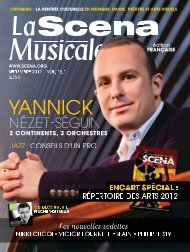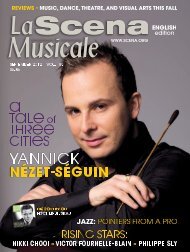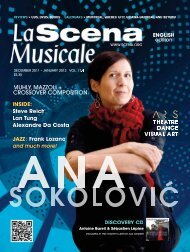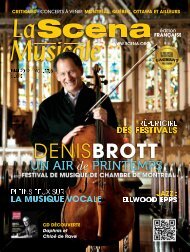You also want an ePaper? Increase the reach of your titles
YUMPU automatically turns print PDFs into web optimized ePapers that Google loves.
Metcalfe et Così fan tutte de Mozart, avec une troupe de mime) et<br />
des transcriptions étonnantes, comme le Winterreise de Schubert<br />
(de Normand Forget) avec le ténor allemand Christoph<br />
Prégardien. Un enregistrement de ce cycle a remporté le prix Opus<br />
l’année dernière. Les projets théâtraux ont permis à la formation<br />
de mieux comprendre la dynamique de son auditoire. «Chaque<br />
mouvement qu’on fait sur scène est essentiel à la communication.<br />
À chaque nouveau projet, on tâche d’en avoir conscience.»<br />
Normalement, tous les musiciens de Pentaèdre s’adressent aux<br />
auditeurs de leurs concerts, mais quand s’il s’agit de le faire en allemand<br />
ou en italien, c’est Marsolais qui s’empare du micro. (Il possède<br />
des rudiments d’italien depuis sa tournée asiatique de l’été<br />
2004 avec l’Orchestre national d’Italie.)<br />
Mais on est encore loin de la carrière de soliste. «<strong>La</strong> situation<br />
est difficile pour un corniste, explique Marsolais. Les orchestres<br />
ont tendance à juger qu’ils ont déjà un excellent cor solo qui s’en<br />
tire très bien quand un concerto pour cor est au programme.»<br />
En ce qui concerne les sociétés de musique de chambre, elles ne<br />
sont pas habituées à envisager des œuvres avec cor; et pourtant,<br />
le répertoire possible comprend des pièces du calibre de la sonate<br />
de Beethoven déjà mentionnée, du superbe Adagio et Allegro de<br />
Schumann, du quintette de Mozart et du trio de Brahms avec<br />
cordes, sans parler d’œuvres plus modernes.<br />
Il existe, fort heureusement, une voie de salut pour les cornistes<br />
: la musique ancienne. Marsolais connaît le cor baroque<br />
(dont il a joué dans la Messe en si mineur de Bach avec Matthias<br />
Maute et son Ensemble Caprice en octobre) et aussi le cor<br />
naturel sans piston, qui exige du joueur qu’il crée les sons avec<br />
la main et des mouvements des lèvres d’une précision extrême.<br />
Malgré une performance impressionnante de la sonate de<br />
Beethoven sur cet instrument, en 2007, pour l’enregistrement il<br />
a préféré reprendre son cor moderne (réalisé par le facteur allemand<br />
Engelbert Schmid). En effet, s’est-il dit, les CD se rendent<br />
en Europe et on n’était pas tout à fait prêts à se confronter<br />
à des spécialistes du cor naturel.<br />
De retour en Amérique du Nord, en particulier à Montréal,<br />
où il habite avec sa conjointe, l’actrice Julie Daoust, Marsolais a<br />
atteint un certain équilibre dans sa vie de musicien. Certes, les<br />
engagements de soliste sont rares, mais il jouera l’Oratorio de<br />
Noël de Bach avec Bernard <strong>La</strong>badie et Les Violons du Roy à<br />
Carnegie Hall en décembre, et il fera une tournée dans les provinces<br />
de l’Atlantique avec la soprano Marianne Fiset et le<br />
pianiste Michael McMahon en mars (quelques mois après avoir<br />
gravé un CD pour ATMA avec les mêmes artistes). Le 22<br />
novembre prochain, Pentaèdre offre un programme axé sur le<br />
cinéma, avec le pianiste accompagnateur de films muets Gabriel<br />
Thibaudeau. Et le nouveau cor solo associé (avec Pierre Savoie)<br />
de l’Orchestre Métropolitain pourra poursuivre sa relation<br />
d’amour-haine avec le répertoire symphonique.<br />
En ce qui concerne la difficulté à faire carrière de soliste,<br />
Marsolais ne peut qu’essayer de combattre les préjugés qui<br />
entourent son instrument. « C’est une question de culture, ditil<br />
à ce sujet. En Allemagne, ce n’est pas pareil. Là-bas, on<br />
idolâtre ceux qui savent jouer du cor. Tous les orchestres les<br />
mettent à l’honneur dans leur programmation. Ici, les gens<br />
trouvent que c’est un instrument capricieux et peu harmonieux,<br />
puisqu’ils l’entendent de façon imparfaite. Il suffirait peut-être<br />
de les amener à l’écouter différemment. » ■<br />
[Traduction par Anne Stevens]<br />
» Avec Pentaèdre et le pianiste Gabriel Thibaudeau, le 22 novembre (19h).<br />
» Concerto brandebourgeois no 2 de Bach, Symphonie no 103, « Roulement<br />
de timbales » de Haydn, Symphonie no 2 de Schumann. Avec l’Orchestre<br />
Métropolitain, le 9 novembre (19h30).<br />
» Concerto pour piano de Poulenc, <strong>La</strong> Tragédie de Salomé de Schmitt, Ma<br />
Mère l’Oye de Ravel. Avec l’Orchestre Métropolitain, le 22 novembre (16h).<br />
Whatever Marsolais had learned in Germany, it was good enough to land<br />
him the principal job in the Kitchener-Waterloo Symphony, which was<br />
undergoing a conductor search in 2000-2001. Things were more stable at<br />
the Quebec Symphony Orchestra, which Marsolais joined the following season.<br />
This is where the Tchaikovsky Fifth Symphony virus struck, and a particularly<br />
deadly strain, since as associate principal Marsolais was on overture<br />
and concerto duty and rarely played the true symphonic repertoire.<br />
“In the three years I was there,” Marsolais said, “I can remember maybe<br />
three concerts where I enjoyed myself fully. If it had been like this (i.e. enjoyable)<br />
all the time, I think I would still be there. It’s just the inconsistency of<br />
what you have to play. After a while, after it’s been almost a year since you<br />
had something interesting to play, it’s very easy to realize you can start practising<br />
less and no one will notice. I could see that where I was going was in<br />
that direction and I didn’t want to keep going there.”<br />
A return to Montreal was in order. There was an opening in the wind quintet<br />
Pentaèdre (the name is French for pentahedron) and Marsolais accepted it<br />
with relish. As artistic director since 2005 he has continued to move the group<br />
beyond the limited standard repertoire, to participate in operas (John<br />
Metcalfe’s A Chair in Love and Mozart’s Così fan tutte with a mime company)<br />
and transcriptions as surprising as Schubert’s Winterreise (by Normand Forget)<br />
with the German tenor Christophe Prégardien. A recording of this won the<br />
Opus prize last year.The theatrical projects have enhanced the group’s sense of<br />
audience dynamics.“Every movement we make on stage is important to communication.<br />
In every new project we start now, we try to have that consciousness.”<br />
Typically, all the players speak to the audience at a Pentaèdre concert,<br />
although Marsolais takes the mike on tour when Italian and German are<br />
required. (He acquired some Italian while on an Asian tour with the Italian<br />
International Orchestra in the summer of 2004.)<br />
Of course, none of this activity falls under the special aegis of solo. “It’s<br />
hard for a horn player,” Marsolais explained,“because all the orchestras you<br />
approach just say, ‘Well, we have a very good horn player playing principal<br />
and if we were to program a horn concerto, we might as well offer it to him,<br />
and he’s going to do a decent job.’” As for chamber societies, they are simply<br />
not accustomed to hiring horn players, even though the available repertoire<br />
includes the aforementioned Beethoven Sonata, Schumann’s lush Adagio<br />
and Allegro and, with some string support, a Quintet by Mozart and a Trio<br />
by Brahms, to say nothing of more recent works.<br />
There is, happily, another avenue for horn achievement: early music.<br />
Marsolais is handy with the baroque horn (on which he played Bach’s Mass in B<br />
Minor with Matthias Maute and his Ensemble Caprice in October) and has even<br />
mastered the valveless natural horn, which requires the player to create pitches<br />
with a combination of hand-stopping and ultra-precise lip pressure. He gave an<br />
impressive performance of the Beethoven on this instrument in 2007 but reverted<br />
to his modern horn (by the German maker Engelbert Schmid) for the record-<br />
AS ARTISTIC DIRECTOR, Marsololais pushes<br />
the Pentaèdre ensemble towards innovative<br />
theatrical and collaborative projects.<br />
« CHAQUE MOUVE-<br />
MENT QU’ON FAIT<br />
SUR SCÈNE EST<br />
ESSENTIEL À LA<br />
COMMUNICATION.»<br />
MARSOLAIS<br />
16 Novembre 2009 November




